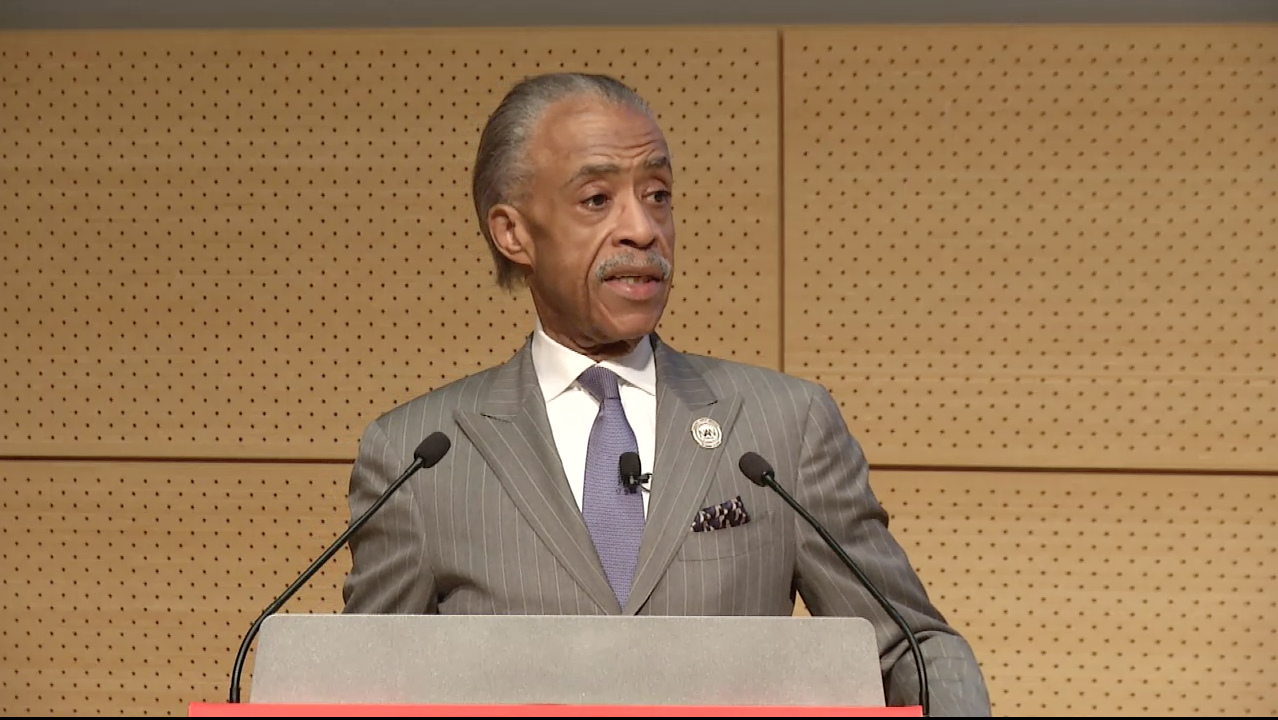Al Sharpton’s whole worldview was shifting in high school when his sister started bringing him down to Greenwich Village where he first met poet Allen Ginsberg, he said during a Tuesday talk at the university.
“Ginsberg was the first gay I met,” Sharpton said.
In the poet, Sharpton saw a man entirely open about his sexuality, a dramatic departure from the don’t-ask-don’t-tell culture of his childhood church that he went on to challenge, he said.
“In high school, I interviewed Allen Ginsberg. So, I dealt with gay rights from when I was in school,” the reverend said.
Through his own life experiences Sharpton seeks to challenge the notion that the entire black community is homophobic, though he concedes that many are.
The reverend’s trip down memory lane came as part of a talk on social justice in the Tishman Auditorium in the University Center, as part of the Henry Cohen Lecture series he spoke with Senior Vice President of Social Justice, Maya Wiley.
In the talk, he blasted the Trump administration, saying it’s a byproduct of the sometimes toxic national conversation on race.
“Five years and two days ago Trayvon Martin was killed in Sanford, Florida,” he said.
“When people ask me where we are five years after Trayvon, I could give a whole dissertation, but the quick answer is, Donald Trump and Jeff Sessions,” Sharpton said.
But Sharpton argued that while the conversation has lead to Trump’s rise, the conversation is happening, and that’s good.
Martin’s death helped spark the Black Lives Matter movement we see today.
“If there had not been a movement around Trayvon Martin’s death…George Zimmerman would have never been arrested,” he said.
Sharpton said social media and students helped launch the movement aimed toward improving the lives of minorities, and celebrities have carried done a good job of pushing that movement forward, the Trump administration may stymie it now.
Sharpton highlighted that how, five years to date after Martin’s death, the new attorney general, Jeff Sessions, would not pursue police brutality lawsuits made against law enforcement.
“When people ask me where we are five years after Trayvon, I could give a whole dissertation, but the quick answer is, Donald Trump and Jeff Sessions,” Sharpton said.
Sharpton also criticized U.S. Secretary of Education Betsy DeVos on a statement she released on Monday after a meeting she had with presidents of historically black colleges and universities.
"I don't know where [DeVos] studied, but I suspect it was not at @TheNewSchool." @TheRevAl responds to comment on HBCUs & school choice. pic.twitter.com/05bmZqDdh2
— Mary Watson (@MaryWatsonTNS) March 1, 2017
He also spoke on the issue of the use of public school bathrooms by transgender youth, especially now that President Trump and his administration rolled back guidelines that let transgender students use the bathrooms of their choice.
"They talk about 'we need to find a way to bring people together' while banning people from bathrooms" – @TheRevAl on Trump administration
— New School History (@TNSHistory) February 28, 2017
"I'm one generation from my mother, who wasn't allowed to go into any bathroom no matter what gender she was." @TheRevAl
— NS Free Press (@NSFreePress) February 28, 2017
Sharpton tried to inspire his crowd to push for more social change by invoking a phrase civil rights leader Ralph Abernathy once told him.
“Normal people don’t fight the system, so you have to have abnormal people,” he said.
Header: New School Livestream.
Odalis is a senior studying Journalism + Design at Lang and the social media manager of The New School Free Press. She spends time watching all of the TV shows and likes to yell about them to her friends, and occasionally writes about it. She is originally from Puerto Rico but calls Miami home (#Miss305) and is very passionate about Cuban food, empanadas, and the salsa dancing emoji.







